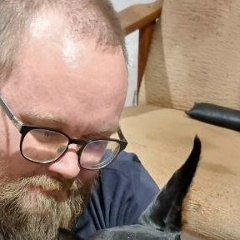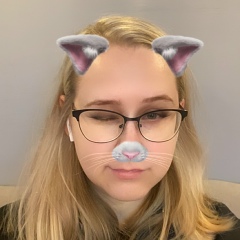В этом году православная Пасха выпала на первое мая. Для меня это пересечение праздиков особенно значимо, потому что я уже около десяти лет осознаю себя христианином, и около трёх - левым.
Среди моих знакомых есть люди, которые не чужды как христианству, так и левым идеям, но почти никто из них не может высказать, а, может быть, и осознать, внутреннюю связь между этими двумя пластами своих убеждений. Это неудивительно - о политике и о религии в среднем не принято говорить за пределами соответствующих сообществ - активистских и церковных собраний. Кроме того в России левая среда в целом антирелигиозна и это неудивительно, учитывая растущее участие государственной церкви в подавлении свободы. Христианская среда, с другой стороны, чаще всего аполитична, а среди интересующихся политикой преобладают правые настроения - или ностальгия по Российской Империи, или неолиберальные взгляды (я уж не говорю про тех, кто умудряется органично сочетать черносотенное православие и сталинизм). Поэтому даже те, кто симпатизирует к левому движению и христианству, не могут найти поддержку своему двойному самоопределению и вынуждены замалчивать какую-то часть себя.
Для меня движение за освобождение людей неразрывно связано с верой. Христианство наследует от иудейских пророков требование освобождения - "разреши оковы неправды, развяжи узы ярма, и угнетенных отпусти на свободу, и расторгни всякое ярмо;" (Ис. 58:6). Если освобождение себя можно попробовать истолковать исключительно в "духовной плоскости" (как освобождение от зла в душе), то освобождение других может быть только социальным действием. Им нельзя заниматься погрузившись в себя и в одиночку - только выйдя к другим, в первую очередь, к тем, кого нужно освободить.
С другой стороны левое движение подразумевает, что люди есть нечто большее, чем сумма их определяющих обстоятельств, что они способны преобразовать старый порядок и создать новый. Вера в высокое предназначение человека, в важность человеческой свободы сближает левое движение с христианской верой.
И поэтому нет ничего удивительного в том, что, например, в Латинской Америке левые атеисты и левые христиане действовали и действуют плечом к плечу - где-то мирно, а где-то с оружием в руках. Этот опыт уважительного разговора между светскими гуманистами и верующими, разговора, который позволяет выстроить совместное действие, нужен сейчас и нам. Поэтому так интересна для меня теология освобождения, ставшая символом социальной совести христианства.
В первую очередь мне хотелось бы привлечь к разговору тех, кто чувствует в себе связь как с христианством, так и с левым движением. Я мечтаю, чтобы в разговоре люди смогли увидеть, высказать и разделить с другими связь между этими частями своего опыта.
С чего начать? Думаю, что для начала следует вспомнить о том, что уже сделано - о латиноамериканской, феминистской, ЛГБТ и других ветвях теологии освобождения. Сделать это лучше всего на небольшой встрече-конференции где-нибудь около 1 мая (лучше всего непосредственно после первомайской демонстрации).
Туда я зову всех, кому это интересно, и кто способен к уважительному разговору.
Среди моих знакомых есть люди, которые не чужды как христианству, так и левым идеям, но почти никто из них не может высказать, а, может быть, и осознать, внутреннюю связь между этими двумя пластами своих убеждений. Это неудивительно - о политике и о религии в среднем не принято говорить за пределами соответствующих сообществ - активистских и церковных собраний. Кроме того в России левая среда в целом антирелигиозна и это неудивительно, учитывая растущее участие государственной церкви в подавлении свободы. Христианская среда, с другой стороны, чаще всего аполитична, а среди интересующихся политикой преобладают правые настроения - или ностальгия по Российской Империи, или неолиберальные взгляды (я уж не говорю про тех, кто умудряется органично сочетать черносотенное православие и сталинизм). Поэтому даже те, кто симпатизирует к левому движению и христианству, не могут найти поддержку своему двойному самоопределению и вынуждены замалчивать какую-то часть себя.
Для меня движение за освобождение людей неразрывно связано с верой. Христианство наследует от иудейских пророков требование освобождения - "разреши оковы неправды, развяжи узы ярма, и угнетенных отпусти на свободу, и расторгни всякое ярмо;" (Ис. 58:6). Если освобождение себя можно попробовать истолковать исключительно в "духовной плоскости" (как освобождение от зла в душе), то освобождение других может быть только социальным действием. Им нельзя заниматься погрузившись в себя и в одиночку - только выйдя к другим, в первую очередь, к тем, кого нужно освободить.
С другой стороны левое движение подразумевает, что люди есть нечто большее, чем сумма их определяющих обстоятельств, что они способны преобразовать старый порядок и создать новый. Вера в высокое предназначение человека, в важность человеческой свободы сближает левое движение с христианской верой.
И поэтому нет ничего удивительного в том, что, например, в Латинской Америке левые атеисты и левые христиане действовали и действуют плечом к плечу - где-то мирно, а где-то с оружием в руках. Этот опыт уважительного разговора между светскими гуманистами и верующими, разговора, который позволяет выстроить совместное действие, нужен сейчас и нам. Поэтому так интересна для меня теология освобождения, ставшая символом социальной совести христианства.
В первую очередь мне хотелось бы привлечь к разговору тех, кто чувствует в себе связь как с христианством, так и с левым движением. Я мечтаю, чтобы в разговоре люди смогли увидеть, высказать и разделить с другими связь между этими частями своего опыта.
С чего начать? Думаю, что для начала следует вспомнить о том, что уже сделано - о латиноамериканской, феминистской, ЛГБТ и других ветвях теологии освобождения. Сделать это лучше всего на небольшой встрече-конференции где-нибудь около 1 мая (лучше всего непосредственно после первомайской демонстрации).
Туда я зову всех, кому это интересно, и кто способен к уважительному разговору.
This year, Orthodox Easter fell on the first of May. For me, this intersection of holidays is especially significant, because for about ten years I have been conscious of myself as a Christian, and about three - as a left.
Among my acquaintances there are people who are not alien to both Christianity and leftist ideas, but almost none of them can express, and perhaps realize, the internal connection between these two layers of their beliefs. This is not surprising - on average, it is not customary to talk about politics and religion outside the boundaries of the respective communities - activist and church assemblies. Moreover, in Russia, the left-wing environment is generally anti-religious and this is not surprising given the growing participation of the state church in the suppression of freedom. The Christian environment, on the other hand, is most often apolitical, and among those interested in politics the right-wing moods prevail - either nostalgia for the Russian Empire, or neoliberal views (I'm not talking about those who manage to organically combine Black-Hundred Orthodoxy and Stalinism). Therefore, even those who sympathize with the left movement and Christianity cannot find support for their double self-determination and are forced to hush up some part of themselves.
For me, the movement to free people is inextricably linked to faith. Christianity inherits from the Jewish prophets the demand for liberation - "let the chains of iniquity, untie the bonds of yoke, and release the oppressed, and dissolve all yoke;" (Isa. 58: 6). If you can try to interpret the liberation of yourself exclusively in the "spiritual plane" (as the liberation from evil in the soul), then the liberation of others can only be a social action. They can’t be dealt with immersed in themselves and alone - only going out to others, first of all, to those who need to be freed.
On the other hand, the left movement implies that people are more than the sum of their defining circumstances, that they are able to transform the old order and create a new one. Belief in the high destiny of man, in the importance of human freedom brings the left movement closer to the Christian faith.
And therefore it is not surprising that, for example, in Latin America, left atheists and left Christians acted and are acting shoulder to shoulder - somewhere peacefully, and somewhere with arms in their hands. This experience of a respectful conversation between secular humanists and believers, a conversation that allows us to build a joint action, we need now. Therefore, the theology of liberation, which has become a symbol of the social conscience of Christianity, is so interesting to me.
First of all, I would like to attract to the conversation those who feel connected with both Christianity and the left movement. I dream that in a conversation people can see, express and share with others the connection between these parts of their experience.
Where to begin? I think that to begin with, we should recall what has already been done - the Latin American, feminist, LGBT and other branches of the theology of liberation. This is best done at a small meeting-conference somewhere around May 1 (best immediately after the May Day demonstration).
There I call everyone who is interested and who is capable of respectful conversation.
Among my acquaintances there are people who are not alien to both Christianity and leftist ideas, but almost none of them can express, and perhaps realize, the internal connection between these two layers of their beliefs. This is not surprising - on average, it is not customary to talk about politics and religion outside the boundaries of the respective communities - activist and church assemblies. Moreover, in Russia, the left-wing environment is generally anti-religious and this is not surprising given the growing participation of the state church in the suppression of freedom. The Christian environment, on the other hand, is most often apolitical, and among those interested in politics the right-wing moods prevail - either nostalgia for the Russian Empire, or neoliberal views (I'm not talking about those who manage to organically combine Black-Hundred Orthodoxy and Stalinism). Therefore, even those who sympathize with the left movement and Christianity cannot find support for their double self-determination and are forced to hush up some part of themselves.
For me, the movement to free people is inextricably linked to faith. Christianity inherits from the Jewish prophets the demand for liberation - "let the chains of iniquity, untie the bonds of yoke, and release the oppressed, and dissolve all yoke;" (Isa. 58: 6). If you can try to interpret the liberation of yourself exclusively in the "spiritual plane" (as the liberation from evil in the soul), then the liberation of others can only be a social action. They can’t be dealt with immersed in themselves and alone - only going out to others, first of all, to those who need to be freed.
On the other hand, the left movement implies that people are more than the sum of their defining circumstances, that they are able to transform the old order and create a new one. Belief in the high destiny of man, in the importance of human freedom brings the left movement closer to the Christian faith.
And therefore it is not surprising that, for example, in Latin America, left atheists and left Christians acted and are acting shoulder to shoulder - somewhere peacefully, and somewhere with arms in their hands. This experience of a respectful conversation between secular humanists and believers, a conversation that allows us to build a joint action, we need now. Therefore, the theology of liberation, which has become a symbol of the social conscience of Christianity, is so interesting to me.
First of all, I would like to attract to the conversation those who feel connected with both Christianity and the left movement. I dream that in a conversation people can see, express and share with others the connection between these parts of their experience.
Where to begin? I think that to begin with, we should recall what has already been done - the Latin American, feminist, LGBT and other branches of the theology of liberation. This is best done at a small meeting-conference somewhere around May 1 (best immediately after the May Day demonstration).
There I call everyone who is interested and who is capable of respectful conversation.
У записи 11 лайков,
0 репостов.
0 репостов.
Эту запись оставил(а) на своей стене Александр Ковров





























